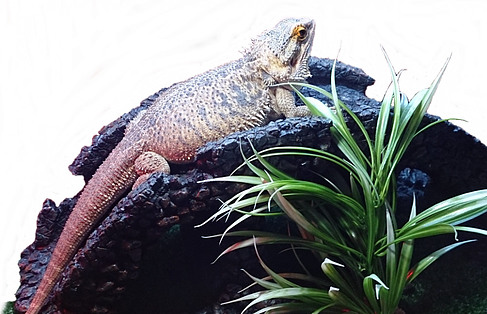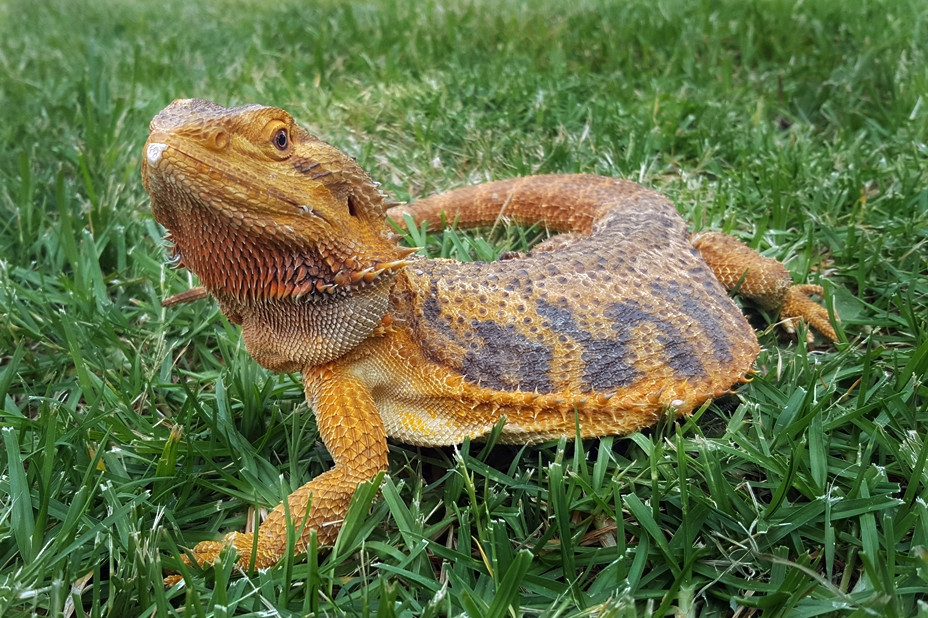Fatty liver disease is a common disease in bearded dragons that do not receive the correct diet or are overfed. Most of the time, an obese dragon will have fatty liver disease. It is a preventable, treatable, and curable disease, but it is best to avoid it completely because it can do permanent or serious damage.
Fatty liver disease is when an overweight dragon starts to lose his/her appetite. When they eat less or not at all, the body will respond by sending fat to the liver to use for energy. It does not sound like a big deal, but in fact, the liver cannot metabolize the increase in fat flow so instead, it gets stored. These fat cells that keep getting stored in the liver are what we call fatty liver disease.
Now fat in the liver does not sound so bad, but the result is a liver that cannot do its job which causes toxin build-up in the body. All the fat and toxin build-up, eventually compromises the immune system leaving the dragon defenseless against viral, fungal, or bacterial infections. It can also in the long run lead to liver failure.

What are the Symptoms of Fatty Liver Disease?
- Weakness
- Vomiting
- Loss of appetite
- Bloated
- Droopiness
- Lethargy
- Jaundice (yellow tinge on skin, gums, and eyes)
- Limbs that are swollen
- Gradual weight gain or weight loss
- Brumation problems
- Changes in fecal character/color
- Severely affected dragons may have a green urinate
- Swollen lump on the right lower area of the stomach, due to an inflamed liver.
Diagnosing Fatty Liver Disease
Diagnosing can only be done by a vet who will do the following…
Get a thorough history of the beardie. This includes symptoms you have noticed, previous vet visits, illnesses, diseases, your dragon’s diet, habitat, and so forth. Once he/she has the history, an examination of the bearded dragon will be done to rule out other diseases or fatty liver disease if your dragon does not have it. If a conclusion is not reached, a series of other tests will be done to come to a conclusion. They include;
Blood Work – When a bearded dragon has FLD, a change in the blood cells can be detected. It can also determine if the disease was caused by bacteria or parasites.
X-rays – The liver is visible on x-rays which means the vet can see if the liver is smaller or larger than it is supposed to be.
Ultrasound – An ultrasound can detect changes in the liver that may have not been seen on the x-rays.
Liver Tests
- Endoscopic evaluation can be done to get samples for testing.
- In some cases, an MRI will be indicated, since it gives clearer soft tissue details.
- If liver disease is the cause; there is a chance of higher Bile acids.
What is the Treatment for Fatty Liver Disease?
The treatment mostly depends on the severity and what your vet decides are the best steps to take. This is only a byline of what can be done.
In Acute Cases
Fluids and nutritional support may be given. If it is more moderate, then oral liquids can be given, but if it is more severe, IV or Intraosseous may be needed to provide the fluids and so forth. Antibiotics may also be prescribed depending on the results of the tests done.
In Chronic Cases
Unfortunately, the more severe the case, the longer it will take to reverse with some cases taking months to even a year or two. This is the reason long-term fluid and nutritional support may be needed. Nutritional support is very important so your vet will discuss with you the ways this can be done. In some cases, tube feeding will be needed and in other cases, a feeding tube will have to be placed.
Recovery
Unfortunately, the success rate for curing fatty liver disease in severe cases is very low, but for acute cases, it is very high. Your beardie will have to be monitored by the hour and your vet will give special instructions about diet and so forth that will be critical to follow exactly in order to treat the dragon properly.
If you suspect your dragon may have fatty liver disease the following can be done until you can get your bearded dragon to the vet. (It will be best to get them to the vet ASAP)
- Get your dragon to exercise in any way possible without hurting them or stressing them out.
- Lower their fat intake and feed them as many staple vegetables and greens as possible.
- Try to encourage them to eat regularly without overfeeding.
- Keep them hydrated with regular baths and by dripping water on their neck every so often. Do not force them to drink, they can choke on the fluid or it may cause an RI.
- Give your dragon probiotics every day that they are not receiving supplements, but do not replace the supplements, they need them especially when they are ill.
- DO NOT FEED PROTEIN! Only greens and veggies till you have seen the vet.
